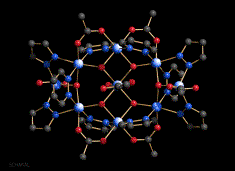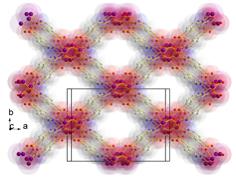
University Associate Professor

Our research is focused on the synthesis and characterisation of new materials, primarily using solvothermal synthesis. In this technique, reactions occur in solvents at temperatures above their normal boiling points by containing the reaction mixture within a pressure vessel. We have found this method to be particularly good for preparing porous materials for hydrogen storage and gas separation as well as new magnetic materials. We have an extensive range of collaborations with groups in the UK, the rest of Europe and in South Korea for performing measurements on the magnetism and porosity of our compounds.

- Magnetic materials are being prepared as part of the search for 'single molecule magnets' which represent the ultimate in magnetic data storage efficiency. We are also preparing compounds with which physicists can test theoretical models of magnetic behaviour; the same theories can be applied to other types of symmetry breaking in areas as diverse as protein folding and the early universe.
- New porous materials are much sought-after for gas storage in a future hydrogen economy. This is a very active area of research as zero-emission fuel sources are very attractive. Such materials could also be used as size- and shape-selective catalysis as well as gas separation and materials. The 'metal-organic framework' materials prepared in our lab are some of the most efficient hydrogen storage materials yet measured.
Publications
Mixed alkali metal/transition metal coordination polymers with the mellitic acid hexaanion: 2-dimensional hexagonal magnetic nets.
Inorganic chemistry
(2010)
49
3441
(doi: 10.1021/ic902527e)
Pyridine-2,4-dicarboxylate: A versatile building block for the preparation of functional coordination polymers
Journal of Nanoscience and Nanotechnology
(2010)
10
34
(doi: 10.1166/jnn.2010.1505)
Non-classical behaviour in anS= 5/2 chain with next nearest neighbour interactions observed from the inelastic neutron scattering of Mn2(OD)2(C4O4)
Journal of Physics: Condensed Matter
(2009)
21
076003
Muon spin relaxation study of manganese hydroxy squarate
Inorganica Chimica Acta
(2008)
361
3718
(doi: 10.1016/j.ica.2008.03.108)
INOR 823-Magnetism of metal organic frameworks
ABSTRACTS OF PAPERS OF THE AMERICAN CHEMICAL SOCIETY
(2008)
235
Synthesis, structure and physical properties of the manganese( ii ) selenide/selenolate cluster complexes [Mn 32 Se 14 (SePh) 36 (P n Pr 3 ) 4 ] and [Na(benzene-15-crown-5)(C 4 H 8 O) 2 ] 2 [Mn 8 Se(SePh) 16 ]
Chemical communications (Cambridge, England)
(2008)
1596
(doi: 10.1039/b714582a)
Synthesis and Structure of Pentamethylcyclopentadienyl Tungsten(V) Complexes Containing Functionalized 6,12-Epiiminodibenzo[b,f][1.5]diazocine Ligands
Organometallics
(2007)
26
6501
(doi: 10.1021/om700810p)
Synthesis, structure and magnetic behaviour of manganese(II) selenolate complexes ∞1[Mn(SePh)2], [Mn(SePh) 2(bipy)2] and [Mn(SePh)2(phen)2] (bipy = bipyridyl, phen = phenanthroline)
European Journal of Inorganic Chemistry
(2007)
2007
4794
(doi: 10.1002/ejic.200700129)
Bimetallic Metal‐Organic Frameworks Containing the ${\rm [M(2,}x-{\rm pdc)^{2-}_{2}}]$ (M = Cu, Pd, Pt; x = 4, 5) Building Block – Synthesis, Structure, and Magnetic Properties
Zeitschrift Fur Anorganische Und Allgemeine Chemie
(2007)
633
2342
(doi: 10.1002/zaac.200700235)
Order-disorder transition in monoclinic sulfur: a precise structural study by high-resolution neutron powder diffraction (vol B62, pg 953, 2006)
Acta Crystallographica Section B Structural Science
(2007)
63
803
(doi: 10.1107/s0108768107044631)
- ‹ previous
- Page 3

